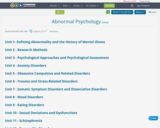
Selection of reading resources for Abnormal Psychology courses.
These resources were compiled by Dr. Susan Harvey, Associate Professor at Delta College
- Subject:
- Life Science
- Material Type:
- Reading
- Date Added:
- 07/16/2018

Selection of reading resources for Abnormal Psychology courses.
These resources were compiled by Dr. Susan Harvey, Associate Professor at Delta College
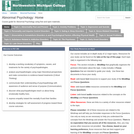
This LibGuide was designed to accompany a community college course in Abnormal Psychology. It contains original material created by the instructor (Mind Maps and Focus Questions), as well as supporting readings gathered from other open sources and some links to freely available copyrighted material. Institutions with a subscription to the LibGuides platform may want to make a copy so they can adapt it to local needs and control the content.

This resource is a video abstract of a research paper created by Research Square on behalf of its authors. It provides a synopsis that's easy to understand, and can be used to introduce the topics it covers to students, researchers, and the general public. The video's transcript is also provided in full, with a portion provided below for preview:
"Osteochondritis dissecans, or OCD, is a bone disease that wears away joints and the cartilage that covers them. It occurs most often in children and adolescents. While OCD has been documented and studied for nearly 150 years, researchers still don’t know what causes it. Reporting in The American Journal of Sports Medicine, one group offers up new findings that point to at least one factor that surgeons should look out for. The team looked at radiographs of 61 knees of patients undergoing surgery for OCD. Those patients were just over 23 years old on average, and 77% of them were men. The researchers reviewed the radiographs for mechanical alignment, as previous studies have speculated that deformities due to malalignment contribute to OCD. What they found was that patients with OCD did in fact show signs of off-axis effects. Specifically, they observed that the location of OCD lesions correlated with the deviation of the mechanical axis of the leg..."
The rest of the transcript, along with a link to the research itself, is available on the resource itself.
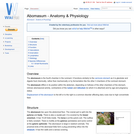
The abomasum is the fourth chamber in the ruminant. It functions similarly to the carnivore stomach as it is glandular and digests food chemically, rather than mechanically or by fermentation like the other 3 chambers of the ruminant stomach.

CropWatch is a central resource for University of Nebraska–Lincoln Extension information on crop production and pest management. It is written by Extension Educators and Specialists and produced by IANR Media in the UNL Institute of Agriculture and Natural Resources.
Information is organized into two key areas, each of which offers thousands of crop-specific articles for Nebraska producers and crop consultants:
The CropWatch newsletter, which includes timely articles published to the site's home page. New issues are published weekly during the heart of the crop production season and generally biweekly during the remainder of the year. Older articles are archived for later review.
CropWatch also includes:
- Calendar of ag events and programs
- Daily news and updates via Twitter at UNL_CropWatch (also displayed on the home page)
- Ag decision-aid tools and resources from UNL Extension
- Content tags at the end of individual stories to help you located related articles released since April 2016.
- Use the Search box in the top right of every page or the Archives to locate additional articles.
- Crop-specific production and pest management sections, with additional sites for whole farm and production systems. Use the top red-bar navigation to access specific crop, management and related topics.
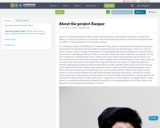
Description about the Kaspar Project
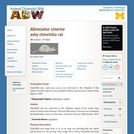
Abrocoma cinerea: Information
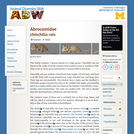
Abrocomidae: Information
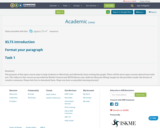
The purpose of this open course aims to help students to effectively and efficiently learn writing line graph. There will be more open courses shared soon with you.
The videos in this course are provided by British Council and IELTS-Simon.com; slides by Shuyuan Wang; images by the providers under the license of creative commons.
Please feel free to download them.
Hope you have a enjoyable learning journey!
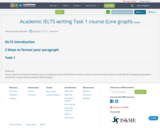
This is a place for Chinese students who are studying or will study IELTS for further study in countries which require to take IELTS as language assessment except UK, to better learn academic IELTS writing.
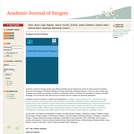
Academic Journal of Surgery (AJS) is the official scientific journal of Research Center for Improvement of Surgical Outcomes & Procedures (RCISOP) affiliated to Tehran University of Medical Sciences. AJS is an open access, peer-reviewed, and quarterly journal that considers for publication articles in all fields and specialties of surgery in English language. This journal has both online and print versions and no charges are levied for publication.
Currently, AJS is indexed and abstracted in: Citefactor, UlrichsWeb, Index Copernicus (IC), Directory of Research Journal Indexing (DRJI), Google Scholar, International Committee of Medical Journal Editors (ICMJE), Open Academic Journals Index (OAJI), Advanced Science Index (ASI), Unversal Impact Factor (UIF), Directory of Abstract Indexing for Journals (DAJI), JournalTOCs, Electronic Journal Library (EZB), Scientific Indexing Services (SIS), AcademicKeys, Research Bible, InfoBase Index, Cosmoc Impacr Factor, Scholar Steer, Magiran, and IranMedex.
AJS focuses on all fields and specialties of surgery including General Surgery, Orthopedic Surgery, Pediatric Surgery, Neurosurgery, Plastic Surgery, Cardiothoracic Surgery, Vascular Surgery, Endocrine Surgery, GI Surgery, Colorectal Surgery, Urology, Surgical Oncology, Radiology, Anaesthesia, Trauma Services, ENT, particularly about surgical practice and research. Content includes Original Articles, Systematic Review or Meta-Analysis, Review Articles, Case Reports, Letters to the Editor, Clinical Trials and Health Policy Challenge.
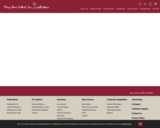
Over the last 50 years, we argue that incentives for academic scientists have become increasingly perverse in terms of competition for research funding, development of quantitative metrics to measure performance, and a changing business model for higher education itself. Furthermore, decreased discretionary funding at the federal and state level is creating a hypercompetitive environment between government agencies (e.g., EPA, NIH, CDC), for scientists in these agencies, and for academics seeking funding from all sources—the combination of perverse incentives and decreased funding increases pressures that can lead to unethical behavior. If a critical mass of scientists become untrustworthy, a tipping point is possible in which the scientific enterprise itself becomes inherently corrupt and public trust is lost, risking a new dark age with devastating consequences to humanity. Academia and federal agencies should better support science as a public good, and incentivize altruistic and ethical outcomes, while de-emphasizing output.
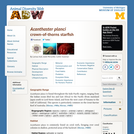
Acanthaster planci: Information
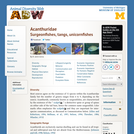
Acanthuridae: Information
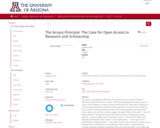
Questions about access to scholarship go back farther than recent debates over subscription prices, rights, and electronic archives suggest. The great libraries of the past—from the fabled collection at Alexandria to the early public libraries of nineteenth-century America—stood as arguments for increasing access. In The Access Principle, John Willinsky describes the latest chapter in this ongoing story—online open access publishing by scholarly journals—and makes a case for open access as a public good.
A commitment to scholarly work, writes Willinsky, carries with it a responsibility to circulate that work as widely as possible: this is the access principle. In the digital age, that responsibility includes exploring new publishing technologies and economic models to improve access to scholarly work. Wide circulation adds value to published work; it is a significant aspect of its claim to be knowledge. The right to know and the right to be known are inextricably mixed. Open access, argues Willinsky, can benefit both a researcher-author working at the best-equipped lab at a leading research university and a teacher struggling to find resources in an impoverished high school.
Willinsky describes different types of access—the New England Journal of Medicine, for example, grants open access to issues six months after initial publication, and First Monday forgoes a print edition and makes its contents immediately accessible at no cost. He discusses the contradictions of copyright law, the reading of research, and the economic viability of open access. He also considers broader themes of public access to knowledge, human rights issues, lessons from publishing history, and "epistemological vanities." The debate over open access, writes Willinsky, raises crucial questions about the place of scholarly work in a larger world—and about the future of knowledge.
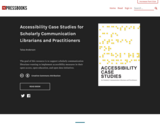
The goal of this resource is to support scholarly communication librarians wanting to implement accessibility measures in their open access, open education, and open data initiatives.
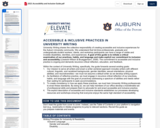
This guide articulates University Writing's practices for accessibility and inclusivity. We use this guide for internal training within our program.

This resource contains all of links and materials for the Accessibility in OER Webinars One through six that were co-facilitated by CAST and ISKME.
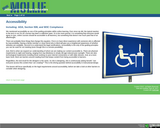
Accessibility in Online Learning
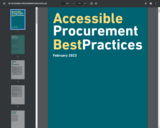
This best practice report pertains to exploring the challenges and processes surrounding to support organizations in promoting inclusion through ICT by ensuring the procurement of accessible platforms that will support the access needs of PWD within the environment.